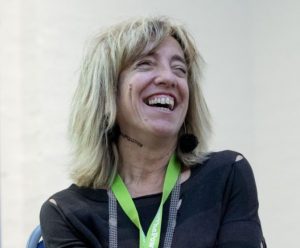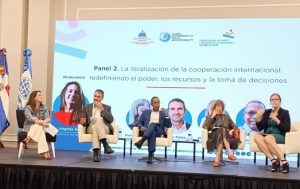#ShiftThePower lands in the Dominican Republic
28 Nov 2024

Florencia Roitstein, Executive Director, Ellas: Mujeres y Filantropía
I was invited to present the #ShiftThePower movement at an international civil society conference hosted by the Centro Nacional de Fomento y Promoción de las Asociaciones sin fines de Lucro (CASFL), a national government agency within the Ministry of Economy of the Dominican Republic. The congress aimed to “highlight the importance of civil society in strengthening democracies in Latin America and the Caribbean, recognizing the crucial role of these organizations in promoting democratic values, defending human rights and building active citizenship.” The fact that a nation-state, in articulation with the World Bank, is organizing a conference with these characteristics is a symptom that something important is changing, and if so, of course, we wanted to support it. So here we go!
The conference began with a cocktail reception the evening before the official opening. The President of the National Promotion Center gave a powerful speech about the importance of civil society in strengthening democracies. She recognized the importance of communities raising their voices in safe spaces, being taken into account in the formulation of public policies, highlighting the specific competencies of the sector such as local knowledge, social capital, social legitimacy, and the use of paradigms such as horizontality, knowledge sharing and collaboration. She also highlighted the contributions to social peace, equity and social inclusion, and gender justice. Finally, she informed, for the reasons mentioned, that the Center supports 750 non-profit organizations with a budget of USD $50 million per year through open and permanent calls. She added that she expects to increase the number of organizations and the budget in the short-term. The President’s speech and positioning in favour of civil society organizations was enormous.
The next day the congress began with drum music setting the tone of the meeting. Spectacular. Then it was the turn of the President of the Nation and the Minister of Economy, Planning and Development. They both gave strong and committed speeches on the role of the state in strengthening social organizations. They referred to civil society organizations as “strategic partners of the State”, “authentic actors of development” and emphasized their scope, territoriality and efficiency. I was surprised to see the Minister staying all morning to take notes on what he heard in the panels.
There are few countries[1] in the region that have a public policy of promotion and strategic alliances with civil society organizations. The Dominican Republic could be another important example of articulation between the public sector and the third sector for the region. Especially in a context where many countries are moving in the opposite direction: the control and weakening of civil society organizations by the public sector.
The panel I was invited to participate in was entitled “The Localization of International Cooperation: Redefining Power, Resources and Decision-Making.” It included a mix of international donors[2] and a single Latin American and Caribbean organization that works in articulation with territorial women’s rights organizations in the region.[3] There were no representatives of grassroots organizations from the Dominican Republic or the region.
“It quickly became clear that localization and the redefinition of power had very different interpretations for each of the representatives.”
The participants agreed that the rules of the game of “international cooperation” need to be changed. However, it quickly became clear that localization and the redefinition of power had very different interpretations for each of the representatives. For some, it was expressed in the percentage of use of economic resources, i.e. how much money stays in the local cooperation office and how much is distributed in the territory. “By 2025, a quarter of our funds will go directly to local partners, today we are at 8%”, said an enthusiastic panelist. For another, it means getting out and walking the territory instead of receiving organizations at headquarters. Another explained that for him: “Localization means moving from running our own projects from the north to contracting with USA organizations with local offices and international professionals to do the work on the ground.”
Indeed, changing the rules of the game can mean many things, depending on how you look at it. For those of us who are part of the #ShiftThePower movement, it means, among other things, recognizing that the fundamental actors in development processes are the members of local communities. That is precisely why the social agenda and decision-making power should belong to them, because they are the ones who know and live the local complexities and have the competencies to provide sustainable collective responses, and they are the most interested in the positive outcomes of the projects as they affect their own quality of life.
Localization, power shift and decolonization are terms that – although they have been present in international jargon for more than 40 years – are beginning to appear with greater frequency and visibility in Latin America and the Caribbean in conferences and other spaces, especially those related to social, gender and environmental justice. As a clear illustration, at this conference, although there was only one panel out of 14 dedicated to them, critical visions of international cooperation were also mentioned in other panels. “We are too much in love with ourselves”, said one representative of the Spanish international cooperation, eliciting complicit laughter from much of the audience.
“It means, among other things, recognizing that the fundamental actors in development processes are the members of local communities. That is precisely why the social agenda and decision-making power should belong to them.”
The enthusiasm generated in the audience during the panel was moving. Many of the grassroots organizations present in the audience suggested that the debate be continued outside the congress and invited those interested to participate in other venues. As a local woman leader of immense recognition in the Dominican Republic said: “The only ones who should localize, decolonize and stop monopolizing power, control and resources are them, international cooperation and donors. We are localization, we are the democratization of power and the resources we mobilize.”
Localization, change of power and decolonization are urgent, so that resources reach the communities that are the protagonists of development. To this end, deep conversations and clear, consensual local practices are essential. However, it is necessary to ensure that they are not reduced to a new narrative by international NGOs and donors at a time when they are being challenged for exercising pervasive control that has historically undermined the agency of local actors and fostered a dynamic of community dependency.
I left this conference excited. Though I am left with many questions about how to mobilize all actors, not only donors and international cooperation, to get more and better resources for territorial organizations defending the right to a dignified life and land, at a historic moment when billions of dollars are being channeled to anti-rights groups in the Latin American and the Caribbean region and the world.[4]
By: Florencia Roitstein, Executive Director, Ellas: Mujeres y Filantropía and 2023/2024 #ShiftThePower Fellow.
[1] Chile, Uruguay and others.
[2] USAID (USA), Plan International (Spain), Christian Aid (United Kingdom), Acapaca.
[3] Ellas: Women & Philanthropy (Latin America and Caribbean).
[4] According to an AWID study, between 2013 and 2017 the “anti-gender” movement received more than USD $3.7 billion in funding (more than three times the amount allocated to gender equity groups worldwide in that period) to fund Christian Right activities to undermine human rights at the UN, in collusion with conservative states and other anti-rights actors.


